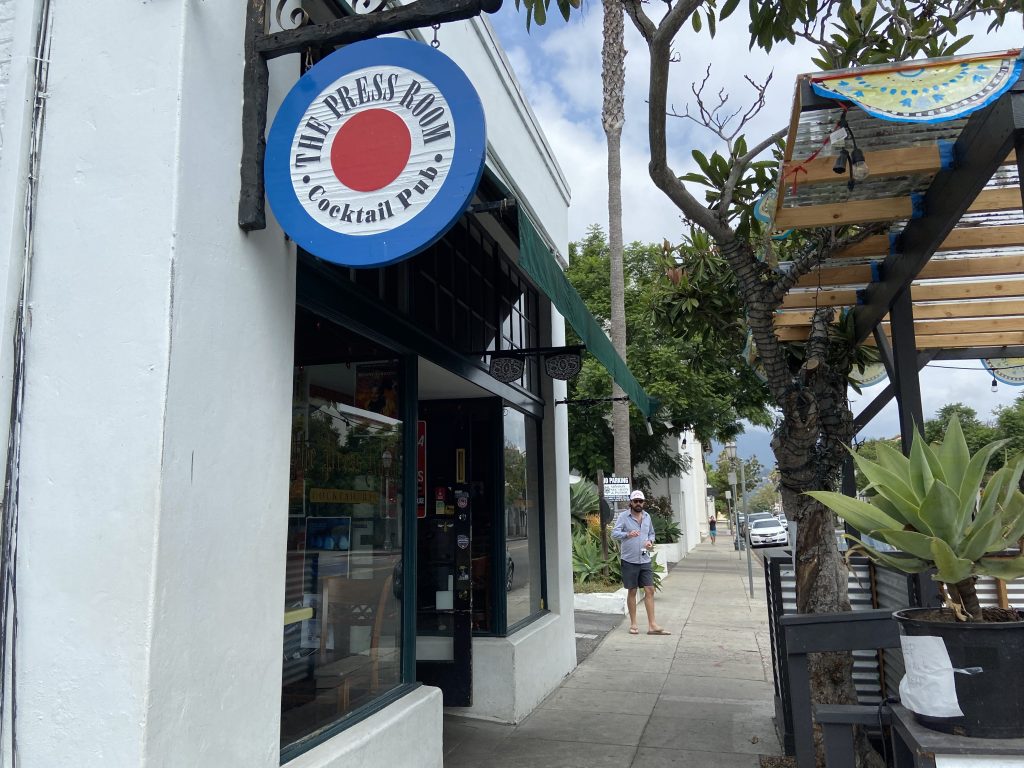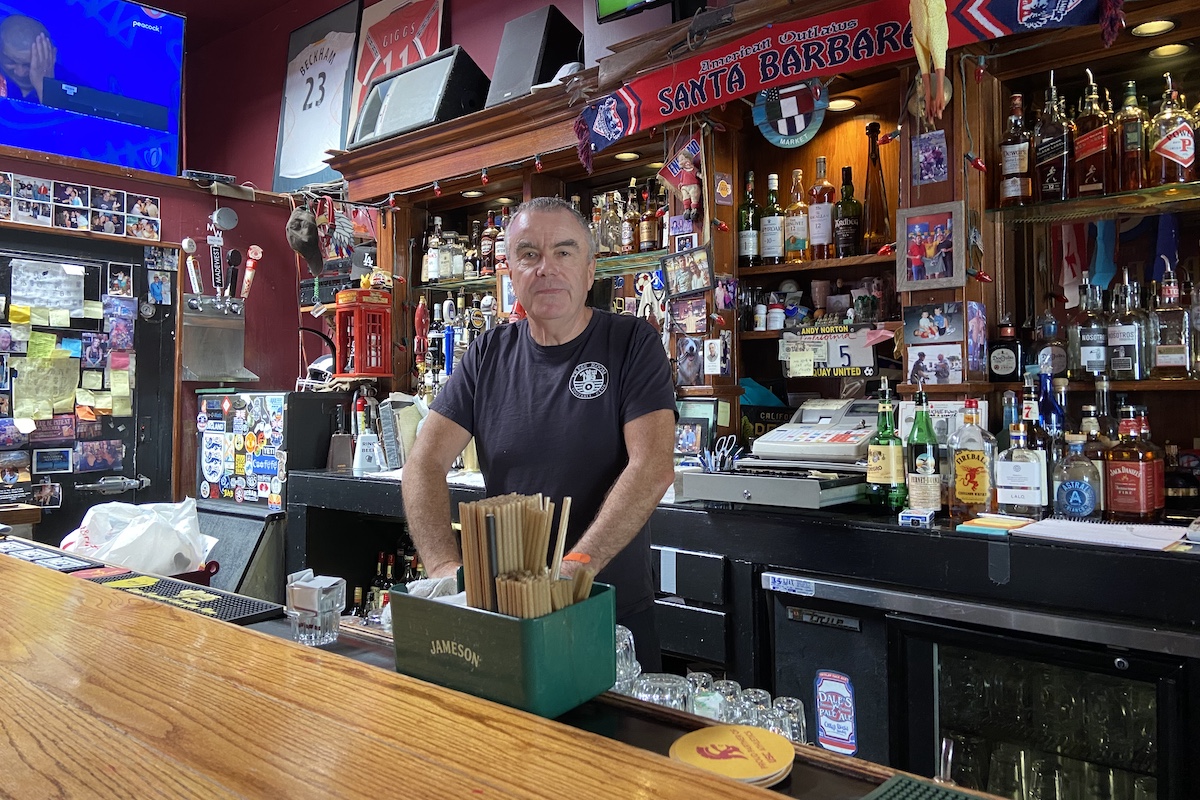It’s early afternoon on a Thursday, and the Press Room on Ortega Street is unusually empty. Only the pub’s proprietor for 28 years, James “Raf” Rafferty, sits behind the bar. Everybody else that had just been inside — regulars, friends, family, and staff — is over at City Hall to plead with members of the Planning Commission to save the longtime soccer-viewing hotspot, which is slated for demolition in favor of a 66-room hotel and restaurant.
There had already been a long road to get to this point. The wrecking ball has been hovering over the 100-plus-year-old building for years, ever since the SIMA Corporation submitted its first application to build housing across six downtown lots — including the Press Room location — in 2020.
After significant pushback on that original development, including a petition with more than 13,000 signatures at the time, it seemed that the Press Room had been saved when SIMA pulled its application, with Chair Jim Knell claiming that the city forcing developers to include affordable housing was effectively making housing impossible to build downtown.
But the battle to save the pub was only half over, and it soon was evident that the corporation had not given up its plan altogether, but instead pivoted to the more profitable idea of a hotel development on the same properties.
The proposed hotel development, which includes not only the Press Room but also several other SIMA-owned properties on State Street, would stretch nearly 33,000 square feet with 66 rooms packed into four stories, with the first floor featuring a restaurant that would be open to the public.
The hotel proposal received just as much public backlash from the bar’s loyal customers and residents pushing for affordable housing, but when the project came before the Planning Commission in August, the board was split down the middle. Some of the more vocal members, such as Commissioner Devon Wardlow, thought that a hotel was irresponsible given the city’s housing crisis and criticized the developers for a lack of public engagement before displacing a longtime tenant.
Other commissioners felt that the commission had no right to stop the development as long as it met the objective standards and checked off all the planning boxes, and that the decision should not be all about the Press Room, since the developers had worked out a relocation agreement with the pub’s operators. After much discussion, the group eventually agreed to kick the project down the road and bring it back in October.
But due to scheduling conflicts, the meeting was moved up to Thursday, September 21, giving the Press Room one more chance before the commission approved the development plan for the hotel.
In soccer terms, the Press Room had to score a last-minute goal in stoppage time or give up its home of nearly 30 years.
With Rafferty back minding the pub, his son Joe read remarks his father had prepared while sitting at the bar earlier that morning.
In the statement, the younger Rafferty recounted the history of the 800-square-foot pub, which opened in April 1995 after his father moved from England to Santa Barbara to raise a family. Ever since opening, the Rafferty family intended to stay as long as possible.
“We weren’t here for a quick buck, but we’re here for a long haul,” he said.
Over the years, the little brick-walled room lined with Rafferty’s personal touch of soccer memorabilia, family photos, and reminders of life back across the pond became a community hub. For every World Cup or major soccer tournament, the bar has been the go-to place for fans, and the only place that’s been open for the late-night and early-morning game times. But to the regulars and staff, it’s been much more.
“A pub, or public house, is just that — a place to commune, a local meeting place — and I’m happy it became that,” the younger Rafferty said. “We’re a place that will help you find a job, give you shelter through fires or floods, or find a friend.”
It was the place where people started relationships (and ended them); and over the years, the pub has hosted its fair share of weddings and wakes.

The building itself, which dates back at least 120 years — “City Planning cannot determine the exact year, but it was in the 1890s,” Rafferty said — survived the 1925 earthquake and has stood in much the same shape, but still, he added, it “is not deemed to have any historic value.”
He worried that mom-and-pop shops are dying out in Santa Barbara for the sake of “progress,” and made it clear that the agreement SIMA had with the Press Room operators was far from a two-way negotiation.
“An agreement involves harmony or accordance in opinion or feeling,” Rafferty said. “This was a take-it-or-leave-it offer in the midst of a global pandemic, which leaves the owners of the Press Room in a precarious situation, the reality being that this agreement will likely put us out of business for good.”
During public comment, several residents and downtown workers expressed their frustration with the prospect of another hotel in the works when the city is in desperate need of housing to meet the community’s needs. In that area alone, some argued, there are already plenty of options, including the Drift Hotel and Hotel Santa Barbara, along with an estimated 800 hotel rooms in the pipeline going through the city planning process.
According to Visit Santa Barbara’s most recent hotel performance data for the month of August, hotels along the South Coast have seen revenues falling due to higher vacancy rates. Room occupancy reportedly dropped to 77 percent in August, while revenues per room fell 11 percent compared to the same month last year.
But for some members of the Planning Commission, the conflict between housing and hotels is something bigger than this one project, and something that can only be addressed by the City Council changing its policies regarding housing development and rental housing development.
“We shouldn’t even be here today facing another hotel application,” said Chair Roxana Bonderson. The original development for housing, she explained, had received unanimous support from the commission before the applicants pulled the plug.
“Here we are, three years later, and our policies and permitting process are so obstructive that our housing projects come back as hotels,” she said. “Nobody should be surprised that a supportable rental housing application was withdrawn, and in its place, yet another hotel application is before us.”
She added that the City Council has “only themselves to blame by not enacting new policies that truly incentivize rental housing applications.”
With the commission given no legal basis to deny the application, which had already been continued, and with the two members that had previously voted against the development absent from the hearing, the hotel’s development agreement was approved 4-1.
Commissioner Lucille Boss was the only member to vote no, saying that she felt like the project was “a radical insult given the bait-and-switch from housing.”
There is a 10-day appeal period open for the project. Rafferty hopes to move the Press Room to a new location, though no final decision has been made.





You must be logged in to post a comment.